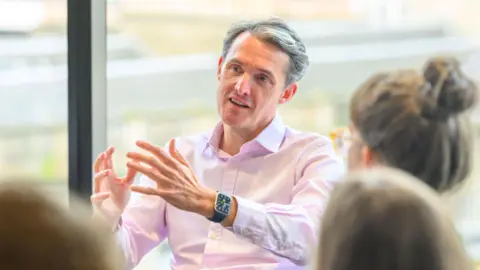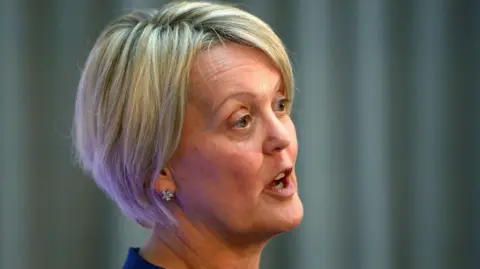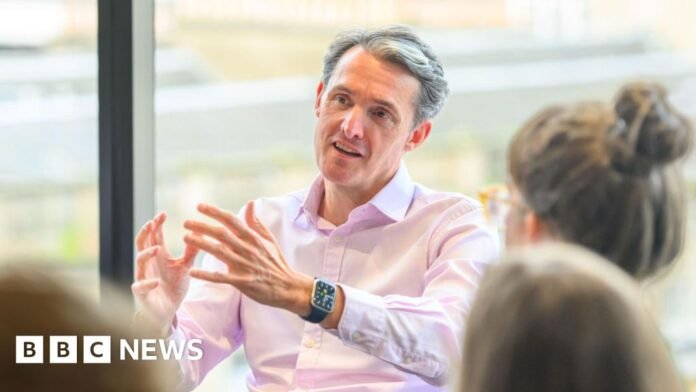Business/economy editor, Scotland
 Paul Chappells/NatWest Group
Paul Chappells/NatWest GroupThere are signs of growing optimism in Scotland’s mid-market firms, according to the boss of the company that handles much of their money.
Royal Bank of Scotland, part of NatWest Group, says travel and tourism are showing notable signs of improvement in their outlook, despite the increased cost of payroll tax and the minimum wage.
Another shaft of brighter sunlight comes from technology and telecoms – but for manufacturing, June brought another month of negative figures.
Paul Thwaite, chief executive of the NatWest Group, is referring to the firm’s monthly business monitor, which draws on data from its customer base.
That includes more than 100,000 Scottish business accounts.
The chief executive is in Scotland for two weeks to hear from those customers and from some of his 11,500 staff north of the border, covering bigger cities and a visit to Orkney.
 Paul Chappells/NatWest Group
Paul Chappells/NatWest GroupOn Friday, he visited the windfarm near Eaglesham built by one of the bank’s bigger clients, Scottish Power.
At an accelerator unit for business start-ups, overlooking Glasgow’s iconic statue of Wellington with traffic cone, he heard from the companies using NatWest facilities and offered advice to take their ideas to the next stage and beyond.
In one such group, all of them agree that they have to go to London for finance.
Aditya Mahapatra, 21, is fresh out of St Andrews University with an economics degree.
For four years, he’s been running his company, Augmentum, that links health and wellness firms with influencers. Almost all of his staff have to be in London.
It’s a charge also levelled at NatWest. With its name change from Royal Bank of Scotland, only retaining that brand for Scottish customers, this felt like confirmation that executive power resided in London.
Thwaite, 53, is from Liverpool and a graduate of Manchester University.
He is married to a Fifer and worked in Edinburgh during his 30s. So he’s alert to the risks of seeming too London-centric, reeling off the stats that suggest otherwise.
“Two million retail customers or households, one in three businesses, almost a third of all of our UK staff,” he says.
“That gives you a sense of the importance of Scotland to the NatWest Group. We are very committed.”
That may become more apparent in 2027, when Royal Bank of Scotland marks its 300th anniversary.
There’s thought already going into telling that story of heritage, while trying to look to the future.
This marks two years since he was phoned in the middle of the night with the chairman’s invitation to take on the top job.
 PA Media
PA MediaDame Alison Rose, had been forced to quit, after discussing the personal account of Nigel Farage with the BBC’s business editor.
That unhappy incident is not, says her successor, the reason why he’s kept a low public profile, saying little to the media beyond discussion of NatWest’s financial reports.
His people tell me this is his first broadcast interview other than those quarterly results days. It’s for radio and online but he’s not for talking on camera.
The most recent such results day, covering the first half of this year, had a strong set of figures.
Pre-tax operating profit was up 18% on last year, to £3.6bn. The bank’s share price is looking a lot perkier.
Having been paid nearly £5m last year, it could see the chief executive get closer to his bonus-laden potential of £7.8m this year.
With guidance to markets that the next set of figures will be better than expected, Thwaite argues that his strategy – disciplined growth, simplification and a focus on risk management – is proving right and paying off.
And while he would prefer to talk about the future, the memory of another of his predecessors, Fred Goodwin, is stalking the Edinburgh International Festival as a morality tale and tragedy, borrowing from ancient Greece, of greed, power, pride and nemesis.

With screen star Brian Cox in a leading role on stage and in Festival publicity, it’s hard to avoid the reminders of the Fred Goodwin story, nearly 17 years on.
“It was relatively early in my career,” Thwaite recalls. He was working in Edinburgh, with UK business customers.
“I didn’t know Fred personally. The bank had expanded significantly during that time. And the UK bank was actually not dissimilar to what it is now – a very strong retail bank, a very strong business bank.”
And a very bloated and vulnerable international and investment bank.
“I was shocked and surprised,” he said.
“What it taught me was how important a role banks play in the economy and for customers, and when things go wrong how impactful that can be on communities, on society and on countries.
“Those who were young and in financial services at that time, and I include myself, have been shaped by the financial crisis.
“The way we think about banking now, how the regulators and government think about banking is very different.”
Thwaite added: “I feel a great sense of responsibility to ensure that the bank is run in a thoughtful, safe, informed way… to learn the lessons from the past and run the bank really well for our customers and also for our colleagues, because they have been incredibly loyal over the last 16 or 17 years, for which I’m very grateful.”

Just over a fifth of staff have remained with RBS/NatWest since the crisis.
For them, he says, the sale in May of the final tranche of UK government shares, having once held 82% of them, was an important symbolic moment.
That doesn’t change the strategy, but it does give the bank more vulnerability to takeover bids and more freedom to take over others.
Recent acquisitions have included parts of Sainsbury’s Bank and Metro Bank.
With further mergers and acquisitions ‘probable’, Thwaite says NatWest’s market valuation is a deterrent against predators.
More opportunities to acquire would be approached carefully and in a disciplined way, and would have to beat the return on internal opportunities to invest, in technology for instance.
Branch closures
Artificial intelligence carries a threat to finance sector jobs, but the bank boss says it’s being used to do routine tasks that free up staff time for talking with customers, while helping to root out fraud and financial crime.
“For AI, it’s still relatively early days,” he says. “I see it as complementing our brilliant colleagues, but I think we’ll know more over the next five or six years.”
There’s a block on further branch closures, but only until next year. Now down to 68 Scottish branches plus bank vans, Thwaite sounds keen to retain that visibility.
“The successful banks of the future will combine very strong physical presence and service from bank colleagues at real moments of truth – whether that’s buying a home, buying a business, buying new premises, but combined with brilliant digital experience, because our customers want and expect that.
“I think it’s important we play a very active role in communities and I want our people to be visible and effective in them.”
With that, he’s off to Aberdeen and Orkney, to see the islands’ flying branch and to listen to the oil and gas sector.
Higher tax weighs heavily on his customers, he says, as does the threat of further increases at the next Westminster budget.
“That’s definitely in business owners’ minds and at board tables,” he says, with a message for Chancellor Rachel Reeves.
“The role of business, the role of financial services needs to be at the heart of that growth agenda.
“Our role is to ensure that we’re supporting businesses who have growth aspirations, and I think it’s very important that the policy agenda is supportive of that.”





